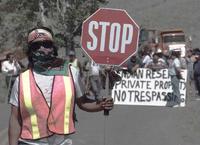Aboriginal Rights
ABORIGINAL RIGHTS are rights of title, occupation and use of land and resources that existed prior to the arrival of European colonial powers and that in Canada are the subject of treaty agreements between federal and provincial governments and aboriginal groups. Colonial powers unsuccessfully wrestled with the issue of aboriginal rights for 400 years and any systematic codification of these rights has eluded almost every government. Since colonial times, aboriginal groups in BC have had a consistent view of what their pre-existing rights and titles are, and from whence those rights derive; they have sent many formal delegations to federal and provincial authorities to articulate their grievances over alienation from their lands and diminished access to their resources.
In addition to the rights inherent in their traditional forms of governance and law, aboriginal groups point to the Royal Proclamation of 1763, in which the British Crown explicitly recognized the existence and continuation of aboriginal title in British N America and implicitly acknowledged the existence and continuity of aboriginal self-government. In BC, however, colonial authorities generally conducted themselves as though aboriginal rights did not exist or had been extinguished with the advent of colonial and later provincial governments (see COLONIAL GOVERNMENT). With the exception of a handful of treaties signed by James DOUGLAS on VANCOUVER ISLAND (see DOUGLAS TREATIES), and an extension of TREATY NO 8 in northeastern BC during the GOLD RUSH to the Klondike in 1899, most FIRST NATIONS in the province remained without treaties. In 1982 the Canadian Constitution recognized and affirmed "existing" aboriginal and treaty rights and a series of court rulings (notably the CALDER CASE, Guerin, SPARROW DECISION and DELGAMUUKW CASE) have defined the nature and extent of these rights. In 1990 the government of BC joined the federal government to negotiate a treaty with the NISGA'A people (see NISGA'A TREATY). And in 1993, following a BC Court of Appeal ruling in Delgamuukw that the GITKSAN and WET'SUWET'EN peoples have "unextinguished, non-exclusive aboriginal rights, other than right of ownership" to much of their traditional territories, the province established the BC TREATY COMMISSION to oversee 3-way negotiations between each First Nation and representatives from the federal and provincial governments.
by Stephen Hume
Reading: Paul Tennant, Aboriginal Peoples and Politics: The Indian Land Question in British Columbia, 1849–1989, 1990.

